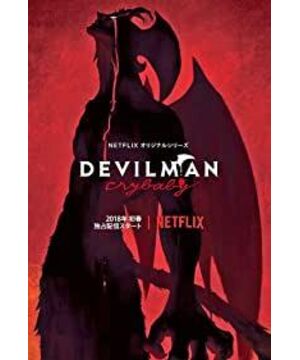Second brush crybaby. For some people, Netflix is "Love Dead", and for me it is "Crybaby". I haven't watched a lot of Japanese comics, but this is the first time I've seen this level of violence. The image of Crybaby has a very strong impact. From the first episode of "Shabbat Party", the image starts to be very aggressive and hits the retina.
As Miko gradually transforms into a demon, the "animal" cry from Miko in the room tugged at my eardrums. At the moment of death, Liyu merged with her subordinates as a four-legged beast, pierced through the devil and exhausted the last trace of life, and turned into a sculpture under the blood-colored moonlight
Shocking. I haven't seen the version in the 1990s, but I think the inspiration for this episode is the story of Satan leading the devils to fight the gods again in "Revelation" (mentioned in the film). Films and television works with religious overtones will make people feel taller (helpless). It feels like Crybaby and "EVA" have many similarities. The relationship between the male protagonist and the male second in the film is very similar to the relationship between Shinji and Kaoru. When it was too late to save Miki, it reminded people of Shinji, who tried desperately to save Asuka but caused the third shock.
In this film, I really like Miko and those hip-hop teenagers (except the one with the backstab). Miko is the most tragic character in the film. She can't even have her real name. She almost exhausted everything for her dreams, but she ended up miserably. Just like the previous scene where Miko was in the house shocked me a lot.
Those rappers are very lovable, especially Cocoon Tai, who tattooed a butterfly on his hand, hoping that one day he can break the cocoon and become a butterfly.
He made Miko empathize with his own songs, and then the two of them "are the same people", but in the end, his ending was very sloppy. As for Fudo Ming, the configuration of the general male protagonist, the devil's body and the human heart, are all set off by the people next to him. The director makes people feel hopeless and reminds me of Xu Yuanxuan. The good and warm things at the beginning were all deceptive, and they were ruined beyond recognition in the end, which made people very depressing, especially the last 3 episodes. In short, although "Crybaby" has so many restricted levels and despair, it is always a story about good and evil and love. Demons are bad, humans are good, and whether demons are bad or good? So are demons always bad and humans never bad?
View more about Devilman: Crybaby reviews











